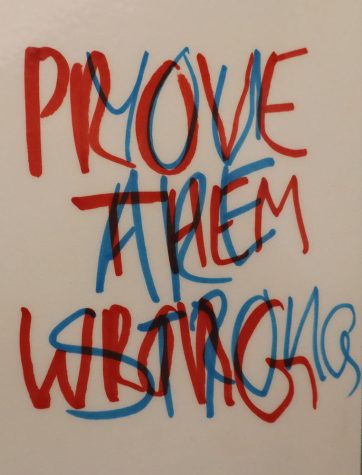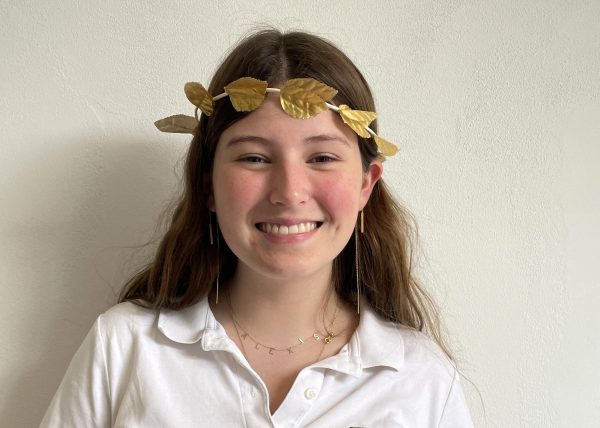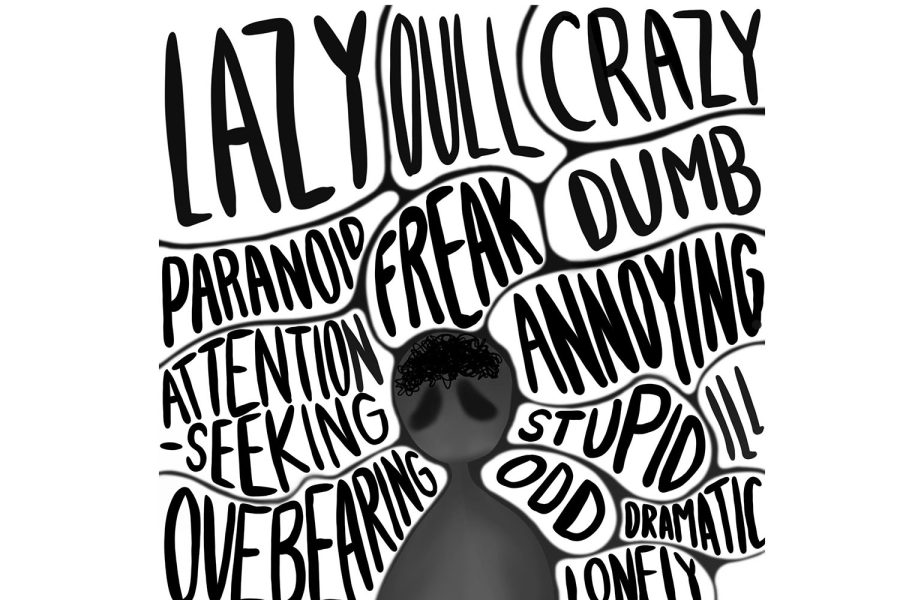Breaking the stereotype: How open communication about mental health can combat stigma
Photo credit: Graphic Illustration by Audrey Chen
In this illustration, a silhouette is seen surrounded by some of the common stereotypes used to describe people who suffer from mental illness. This illustration is meant to depict the isolating nature of stereotypes.
“People with mental health needs cannot tolerate the stress of holding down a job.”
“Personality weakness or character flaws cause mental health problems.”
“People with mental health problems are violent and unpredictable.”
According to mentalhealth.gov, these are some of the most common myths and misconceptions that surround people who suffer from mental health challenges.
A mental health challenge can be described as a health condition that affects one’s behavior or thoughts. There are over 200 classified forms of mental illness, and some of the most common of these disorders include clinical depression, anxiety disorders, attention-deficit/hyperactivity disorder, obsessive-compulsive disorder and more.
Roughly one in five adults, 52.9 million people, live with mental health challenges in the United States, according to the National Institute of Mental Health. But, despite the prevalence of mental illness in the U.S, many still don’t feel comfortable discussing their mental challenges.
A 2019 national poll by the American Psychiatric Organization found that roughly 50% of adult workers were concerned about discussing mental health challenges at their jobs, and more than 66% were concerned about retaliation if they sought out mental health care.
Lexie Horizon (’23), the leader of Archer’s Mental Health Club, was inspired by her own struggles with anxiety to found the club, in hopes of helping other students who may be struggling without support. Horizon discussed some of the common stereotypes she has heard about people who deal with mental challenges and said these stereotypes are often not true.
“[A stereotype] is that people with anxiety are controlling and overbearing,” Horizon said. “Anxiety manifests in different ways and that’s not necessarily controlling or overbearing. People with depression are [stereotyped as] always really sad, but … you could be depressed and struggling and seem like the happiest, most bubbly person.”

There are many types of anxiety disorders ranging from generalized anxiety disorder, to panic disorder, to various phobia-specific anxiety disorders. These disorders are often compressed into one, which leads to the creation of many stereotypes and generalizations.
Sophomore Remi Cannon said she has also faced her own struggles with mental health due to traumatic events she experienced in the past. Additionally, the general overwhelming atmosphere of the pandemic also had an impact on her mental health. Cannon said she noticed similar stereotypes about depression and discussed how these stereotypes are perpetuated by the media.
“The [stereotype] that makes me so angry is that depression has a binary,” Cannon said. “Often in the media, depression is seen as a person that just can’t get out of bed, [but] depression is so different for so many people.”
Depression is a mood disorder that affects how one thinks, acts or feels. Like anxiety, there are many variations of depression. These disorders are often combined in the eyes of the media, which leads to inaccurate generalizations.
Cannon also said this inaccurate media portrayal leads to ignorance about the mental challenges various people face.
“In the media, we have to be so careful of how we portray mental health, though it is very necessary,” Cannon said. “Because then it’s undermined by a lot of communities. It’s like, ‘Oh, you’re not depressed. You’re standing here with me right now and you’re doing school and you’re doing all this.’ It creates a lot of structures for something that can’t just be under one umbrella.”
Shawn Ewbank is a licensed psychologist who provides cognitive-behavioral therapy for adults, children and adolescents. According to his website, Ewbank focuses on therapy for anxiety disorders, depressive disorders, obsessive-compulsive disorder, attention deficit hyperactivity disorder and others.
Ewbank has noticed how the stigmas and stereotypes that surround mental health challenges affect certain individuals’ willingness to openly discuss their mental health.
“[Stereotypes] make it challenging because people are worried that the wrong impression will be given and that they’re going to face judgments,” Ewbank said, “And so, a lot of the time, it causes people to want to push things under the rug even though they’re really distressed … and so it makes life harder for them.”
Ewbank said when patients withhold information about their mental health in fear of being judged, it is oftentimes significantly more detrimental to them and their general wellbeing.
“Unfortunately, when you’re struggling with anything in mental health, and now your life is feeling harder, [pushing things under the rug] is only going to increase what you’re struggling with,” Ewbank said. “So it feeds in on itself and increases the problem.”
Horizon said she felt scared to speak up about her mental health challenges due to fear of being judged. She commented on her own struggles with discussing mental health, and said she was afraid she would be looked at differently.
“I know for me, someone who has definitely struggled with anxiety, it was hard when I was younger to talk about how I was feeling,” Horizon said. “I didn’t want people to think of me as different or think of me as someone who isn’t the same person just because I may be struggling with a hidden illness that other people aren’t struggling with.”
Many have noted the effects the pandemic had on mental health. A study conducted by the University of California, Berkeley found that 14% of Americans in April of 2020 were experiencing “serious psychological distress,” which is more than triple the percent from 2018.
Because of this increase, mental health has become a much more prevalent topic of conversation, with the term “how to maintain mental health” becoming a top-searched term on Google, according to Forbes. Cannon said she believes Generation Z, especially, is successfully instigating healthy dialogue about mental health.
“I think mental health is really fluid and a lot of society doesn’t really adhere to how fluid it is,” Cannon said. “[But] our generation is doing a really good job educating people on mental health.”
Ewbank said he believes everybody needs to be more accepting of others, and in order to accomplish this, he teaches those who do suffer from mental health challenges to be advocates for themselves.
“If the individual is equipped to do so, they [could] actually gain a comfort in being able to explain to people, ‘Well, this is what’s going on with me and this is why I need these things,'” Ewbank said. “[If] you actually learn to feel comfortable to just explain to others, now you’re an advocate for yourself and you’re helping the greater community.”
However, Ewbank said he doesn’t believe students need to do this all by themselves.
“Even if you can’t do that, [if] other people — parents, or teachers or school administration — somebody at some level tries to help on behalf of a student in the school who’s struggling, [it] helps everybody understand and then be more accepting,” Ewbank said.
Although mental health can be challenging to share about, Horizon said openly discussing mental health undeniably aids in destigmatizing the topic.
“Once you start talking about [mental health], it destigmatizes the idea,” Horizon said. “People just become more accepting of it.”

Alexis David joined The Oracle in 2021 as a staff reporter and returned in 2023 as a columnist. Her column centered around politics, social justice and...








